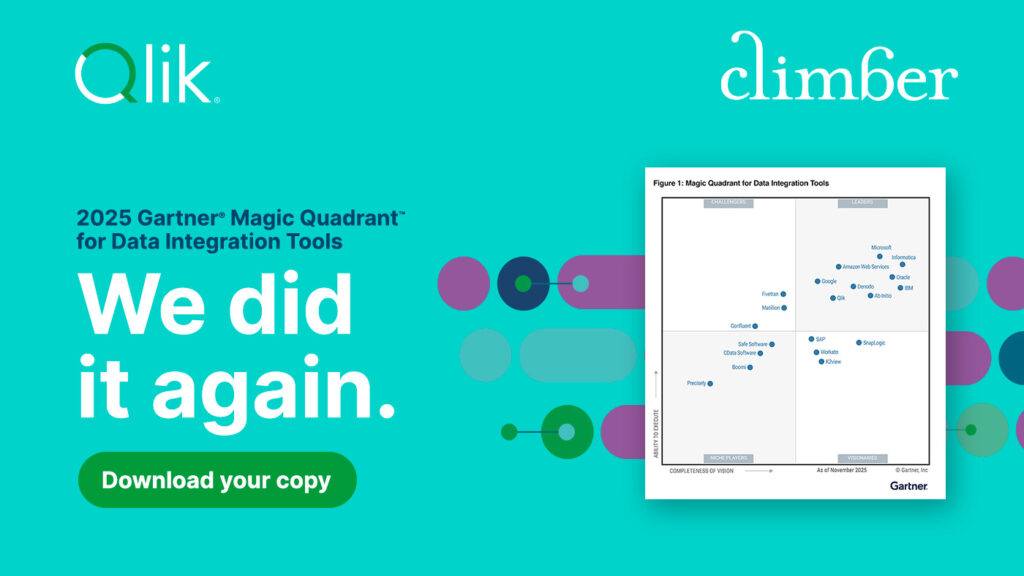
The Power of Data Integration: Benefits, Risks, and Best Practice
Author: Alex Booth, Business Development Manager at Climber.
In today’s fast-paced digital world, organisations generate and collect some serious amounts of data. But without a seamless way to integrate different data sources, insights can remain scattered, decision-making suffers, and businesses lose their competitive edge. Data integration is no longer a luxury, it’s a necessity. However, while a well-executed strategy can unlock new growth opportunities. A poorly planned one can lead to inefficiencies and compliance risks.
The Importance of a Strategic Approach
A successful data integration strategy begins with a clear plan. Organisations must:
- Identify Relevant Data Sources – Understand where data is coming from, its format, and how it will be used.
- Define Integration Goals – Set clear objectives for why data needs to be integrated and how success will be measured.
- Ensure Compatibility – Different data formats and systems must work together harmoniously.
- Implement Governance Protocols – Establish guidelines for data quality, security, and compliance to prevent errors and breaches.
Without a strategic approach, the process can quickly become chaotic, leading to poor data such as duplicate records, inconsistencies, and even security vulnerabilities.
The Transformative Benefits of Proper Data Integration
When done correctly, data integration can revolutionise business operations by providing a unified, comprehensive view of data. Here’s how:
- Enhanced Decision-Making
Centralised data enables businesses to make informed, data-driven decisions faster. With real-time insights, executives can identify trends, optimise processes, and respond proactively to market changes.
- Operational Efficiency
By automating data flows, organisations eliminate redundant manual work, reduce errors, and streamline workflows. This improves productivity and cuts down on operational costs.
- Improved Customer Insights
Integrating customer data from various touchpoints, social media, sales, support, and marketing, creates a 360-degree customer view. Businesses can personalise experiences, predict customer needs, and enhance engagement.
- Regulatory Compliance & Risk Reduction
With proper integration, companies can ensure accurate data tracking, maintain audit trails, and comply with evolving regulations like GDPR.
The Risks of Poor Data Integration
Failing to implement data integration properly can lead to serious consequences. Here are some of the most common pitfalls:
- Data Silos
Without integration, data remains locked within individual departments, leading to fragmented insights and communication gaps between teams.
- Inaccurate Reports & Decision-Making
Inconsistent or duplicate data can distort reports, leading to flawed business decisions. Poor-quality data undermines the very insights businesses rely on.
- Security & Compliance Violations
Improper data handling can result in data leaks, breaches, and non-compliance with industry regulations, exposing organisations to hefty fines and reputational damage.
Best Practices for Seamless Data Integration
To mitigate risks and maximise value, organisations should follow these key best practices:
- Establish Strong Data Governance Policies
Define rules around data ownership, security, and quality control. This ensures consistency, prevents errors, and maintains data integrity.
- Invest in Scalable Integration Solutions
Choose technologies and tools that can adapt to growing data needs. Cloud-based integration platforms, API-driven solutions, and AI-powered automation can future-proof operations.
- Prioritise Data Quality & Security
Implement regular audits, validation rules, and encryption techniques to ensure accurate, secure, and high-quality data.
- Monitor & Optimise Continuously
Data integration is an ongoing process. Regularly assess performance, identify bottlenecks, and refine integration strategies to keep pace with evolving business needs.
Final Thoughts
Data integration is a game-changer for organisations looking to leverage data effectively. A well-structured approach not only drives efficiency and informed decision-making, but also safeguards businesses from compliance risks and operational inefficiencies. By investing in the right strategies and tools, companies can turn raw data into a powerful asset that fuels innovation and growth.
If you’re ready to transform your data strategy and ensure timely, accurate insights, contact Climber today to kick-start your data integration journey. Our expertise can help you navigate complexities and achieve seamless, reliable data integration tailored to your business needs.

WANT TO KNOW MORE? CONTACT US!
Alex Booth
Business Development Manager
alex.booth@climberbi.co.uk
+44 203 858 0668
Jussi Saarinen
Managing Director
jussi.saarinen@climber.fi
+358 40 756 7340
Uutiset

Agentic AI from Qlik: Delivering smarter, faster decision making
Qlik’s Agentic AI framework is the next evolution of Qlik’s AI assistant, Qlik Answers, that delivers smarter, faster, and more actionable insights from your data. Join us to experience the new features and capabilities in Qlik’s unique Agentic AI platform.
>> Register now
What’s New in Qlik Cloud – January 2026
New year, new features! Qlik kicks off 2026 with a strong set of enhancements in Qlik Cloud. The January release introduces analytics updates that support stronger governance, faster development, and simpler analytics delivery. Across data integration, this month includes expanded API controls, broader file-based dataset support, and more expressive validation rule capabilities.
>> Read more
Qlik a Leader in the 2025 Gartner Magic Quadrant for Data Integration Tools
Unsure of how to evaluate the best solution for your needs? Get your free copy of the 2025 Gartner Magic Quadrant report for Data Integration for a quick overview of the landscape and see why Qlik has been named a Leader for the tenth time in a row.
>> Download the report
